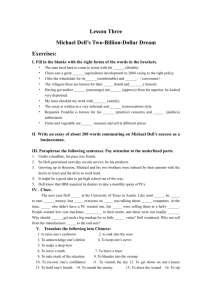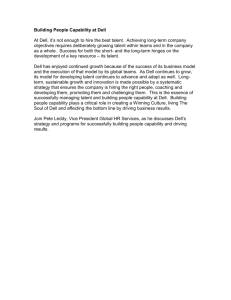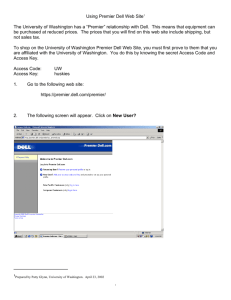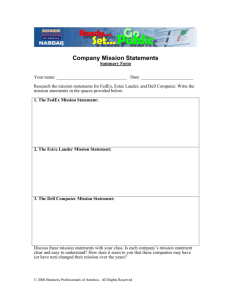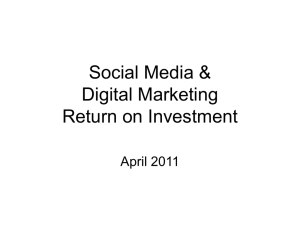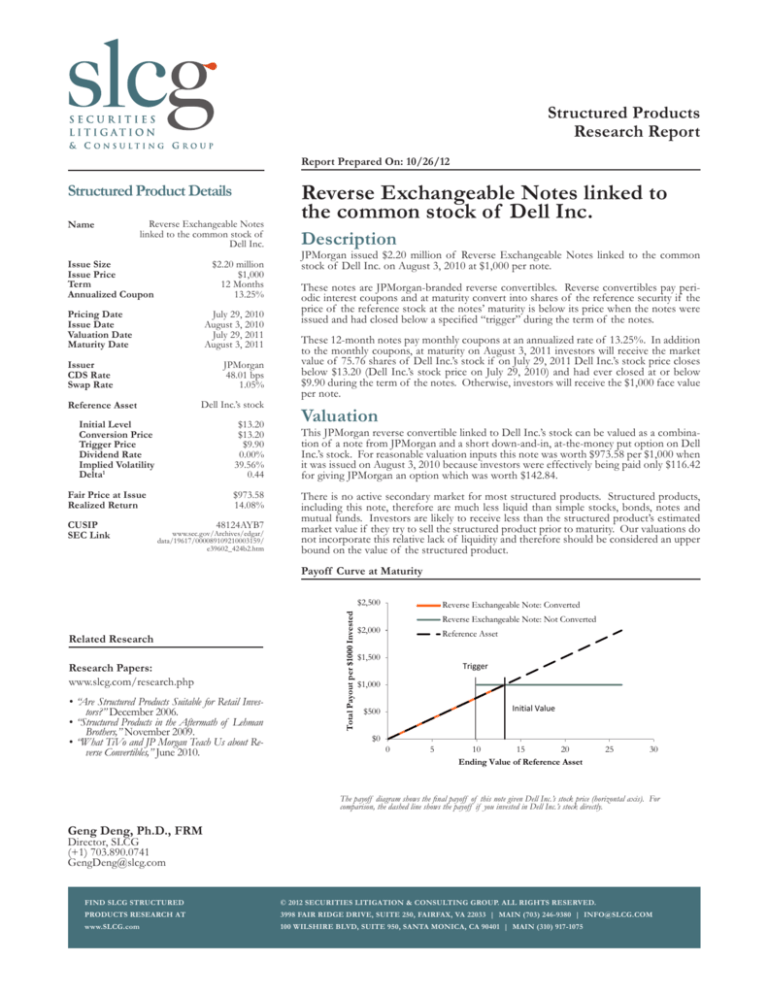
Structured Products
Research Report
Report Prepared On: 10/26/12
Structured Product Details
Name
Reverse Exchangeable Notes
linked to the common stock of
Dell Inc.
Issue Size
Issue Price
Term
Annualized Coupon
$2.20 million
$1,000
12 Months
13.25%
Pricing Date
Issue Date
Valuation Date
Maturity Date
July 29, 2010
August 3, 2010
July 29, 2011
August 3, 2011
Issuer
CDS Rate
Swap Rate
JPMorgan
48.01 bps
1.05%
Dell Inc.’s stock
Reference Asset
Initial Level
Conversion Price
Trigger Price
Dividend Rate
Implied Volatility
Delta1
$13.20
$13.20
$9.90
0.00%
39.56%
0.44
Fair Price at Issue
Realized Return
CUSIP
SEC Link
$973.58
14.08%
48124AYB7
www.sec.gov/Archives/edgar/
data/19617/000089109210003159/
e39602_424b2.htm
Reverse Exchangeable Notes linked to
the common stock of Dell Inc.
Description
JPMorgan issued $2.20 million of Reverse Exchangeable Notes linked to the common
stock of Dell Inc. on August 3, 2010 at $1,000 per note.
These notes are JPMorgan-branded reverse convertibles. Reverse convertibles pay periodic interest coupons and at maturity convert into shares of the reference security if the
price of the reference stock at the notes’ maturity is below its price when the notes were
issued and had closed below a specified “trigger” during the term of the notes.
These 12-month notes pay monthly coupons at an annualized rate of 13.25%. In addition
to the monthly coupons, at maturity on August 3, 2011 investors will receive the market
value of 75.76 shares of Dell Inc.’s stock if on July 29, 2011 Dell Inc.’s stock price closes
below $13.20 (Dell Inc.’s stock price on July 29, 2010) and had ever closed at or below
$9.90 during the term of the notes. Otherwise, investors will receive the $1,000 face value
per note.
Valuation
This JPMorgan reverse convertible linked to Dell Inc.’s stock can be valued as a combination of a note from JPMorgan and a short down-and-in, at-the-money put option on Dell
Inc.’s stock. For reasonable valuation inputs this note was worth $973.58 per $1,000 when
it was issued on August 3, 2010 because investors were effectively being paid only $116.42
for giving JPMorgan an option which was worth $142.84.
There is no active secondary market for most structured products. Structured products,
including this note, therefore are much less liquid than simple stocks, bonds, notes and
mutual funds. Investors are likely to receive less than the structured product’s estimated
market value if they try to sell the structured product prior to maturity. Our valuations do
not incorporate this relative lack of liquidity and therefore should be considered an upper
bound on the value of the structured product.
Payoff Curve at Maturity
Related Research
Research Papers:
www.slcg.com/research.php
•“Are Structured Products Suitable for Retail Investors?” December 2006.
•“Structured Products in the Aftermath of Lehman
Brothers,” November 2009.
•“What TiVo and JP Morgan Teach Us about Reverse Convertibles,” June 2010.
Total Payout per $1000 Invested
$2,500
Reverse Exchangeable Note: Converted
Reverse Exchangeable Note: Not Converted
$2,000
Reference Asset
$1,500
Trigger
$1,000
Initial Value
$500
$0
0
5
10
15
20
Ending Value of Reference Asset
25
30
The payoff diagram shows the final payoff of this note given Dell Inc.’s stock price (horizontal axis). For
comparison, the dashed line shows the payoff if you invested in Dell Inc.’s stock directly.
Geng Deng, Ph.D., FRM
Director, SLCG
(+1) 703.890.0741
GengDeng@slcg.com
FIND SLCG STRUCTURED
© 2012 SECURITIES LITIGATION & CONSULTING GROUP. ALL RIGHTS RESERVED.
PRODUCTS RESEARCH AT
3998 FAIR RIDGE DRIVE, SUITE 250, FAIRFAX, VA 22033 | MAIN (703) 246-9380 | INFO@SLCG.COM
www.SLCG.com
100 WILSHIRE BLVD, SUITE 950, SANTA MONICA, CA 90401 | MAIN (310) 917-1075
Reverse Exchangeable Notes linked to the common stock of Dell Inc.
Page 2
Maturity Payoff Diagram
Principal Payback Table
Dell Inc.’s
Stock
Converted
Note Payoff
$0.00
$0.00
$1.32
$100.00
$2.64
$200.00
$3.96
$300.00
$5.28
$400.00
$6.60
$500.00
$7.92
$600.00
$9.24
$700.00
$10.56
$800.00
Non-Converted Note
Payoff
YES
YES
$1,000.00
$11.88
$900.00
$1,000.00
$13.20
$1,000.00
$1,000.00
$14.52
$1,000.00
$1,000.00
$15.84
$1,000.00
$1,000.00
$17.16
$1,000.00
$1,000.00
$18.48
$1,000.00
$1,000.00
$19.80
$1,000.00
$1,000.00
Did Dell Inc.’s stock price
close below the trigger
level $9.90 during the term
of the notes?
Did Dell Inc.’s stock price
on July 29, 2011 close
below $13.20?
You will receive the
market value of 75.76
shares of Dell Inc.’s
stock at maturity.
NO
NO
You will receive $1,000
per note at maturity.
You will receive $1,000
at maturity.
The contingent payoffs of this Reverse Exchangeable Note.
Analysis
This reverse convertible’s 13.25% coupon rate is higher than the yield JPMorgan paid on
its straight debt but, in addition to JPMorgan’s credit risk, investors bear the risk that they
will receive shares of Dell Inc.’s stock when they are worth substantially less than the face
value of the note at maturity.
Investors purchasing reverse convertibles effectively sell put options to JPMorgan and
post the note’s issue price as collateral to secure satisfaction of the investors’ obligations
under the option contracts. JPMorgan pays investors a “coupon” that is part payment for
the put options and part interest on the investors’ posted collateral. This reverse convertible is fairly priced if and only if the excess of the reverse convertible’s “coupon rate”
above the interest JPMorgan pays on its straight debt equals the value of the put option
investors are giving to JPMorgan. Whether the reverse convertible is suitable or not is
equivalent to whether selling put options on the reference stock at the option premium
being paid by JPMorgan was suitable for the investor.
JPMorgan’s Stock Price
$60
$55
$50
$45
$40
$35
$30
$25
$20
$15
$10
The graph above shows the adjusted closing price of the issuer JPMorgan for the past several years. The stock
price of the issuer is an indication of the financial strength of JPMorgan. The adjusted price shown above
incorporates any stock split, reverse stock split, etc.
Reverse Exchangeable Notes linked to the common stock of Dell Inc.
Page 3
JPMorgan’s CDS Rate
120
100
80
60
40
20
0
Credit default swap (CDS) rates are the market price that investors require to bear credit risk of an issuer such as JPMorgan. CDS rates are usually given in basis points (bps). One
basis point equals 0.01%. Higher CDS rates reflect higher perceived credit risk, higher required yields, and therefore lower market value of JPMorgan’s debt, including outstanding Reverse
Exchangeable Note. Fluctuations in JPMorgan’s CDS rate impact the market value of the notes in the secondary market.
Dell Inc.’s Stock Price
$30.0
$25.0
$20.0
$15.0
$10.0
$5.0
The graph above shows the historical levels of Dell Inc.’s stock for the past several years. The final payoff of this note is determined by Dell Inc.’s stock price at maturity. Higher fluctuations in Dell Inc.’s stock price correspond to a greater uncertainty in the final payout of this Reverse Exchangeable Note.
Realized Payoff
This note matured on August 3, 2011 and investors received $1,000.00 per note.
Reverse Exchangeable Notes linked to the common stock of Dell Inc.
Page 4
Reference Asset Dell Inc.’s Stock’s Implied Volatility
120%
100%
80%
60%
40%
20%
0%
The annualized implied volatility of Dell Inc.’s stock on July 29, 2010 was 39.56%, meaning that options contracts on Dell Inc.’s stock were trading at prices that reflect an expected
annual volatility of 39.56%. The higher the implied volatility, the larger the expected fluctuations of Dell Inc.’s stock price and of the Note’s market value during the life of the Notes.
Decomposition of this Reverse Exchangeable Note
A zero-coupon note from JPMorgan
$984.84
Reverse Exchangeable Notes
linked to the common stock of
Dell Inc.
A short down-and-in at-the-money
put option
($142.84)
Present value of all future coupons
$131.58
$973.58
This note can be decomposed into different components, and each component can be valued separately. The chart above shows the value of each component of this Reverse Exchangeable Note.
1.Delta measures the sensitivity of the price of the note to the Dell Inc.’s stock price on July 29, 2010.
2.CDS rates can be considered a measure of the probability that an issuer will default over a certain period of time and the likely loss given a default. The lower the CDS
rate, the lower the default probability. CDS rate is given in basis points (1 basis point equals 0.01%), and is considered as a market premium, on top of the risk-free rate,
that investors require to insure against a potential default.
3.Fair price evaluation is based on the Black-Scholes model of the Dell Inc.’s stock on July 29, 2010.
4.Calculated payout at maturity is only an approximation, and may differ from actual payouts at maturity.
5.Our evaluation does not include any transaction fees, broker commissions, or liquidity discounts on the notes.
©2012 Securities Litigation and Consulting Group. All Rights Reserved. This research report and its contents are for informational and educational purposes
only. The views and opinions on this document are those of the authors and should not be considered investment advice. Decisions based on information
obtained from this document are your sole responsibility, and before making any decision on the basis of this information, you should consider whether the
information is appropriate in light of your particular investment needs, objectives and financial circumstances. Investors should seek financial advice regarding
the suitability of investing in any securities or following any investment strategies.


